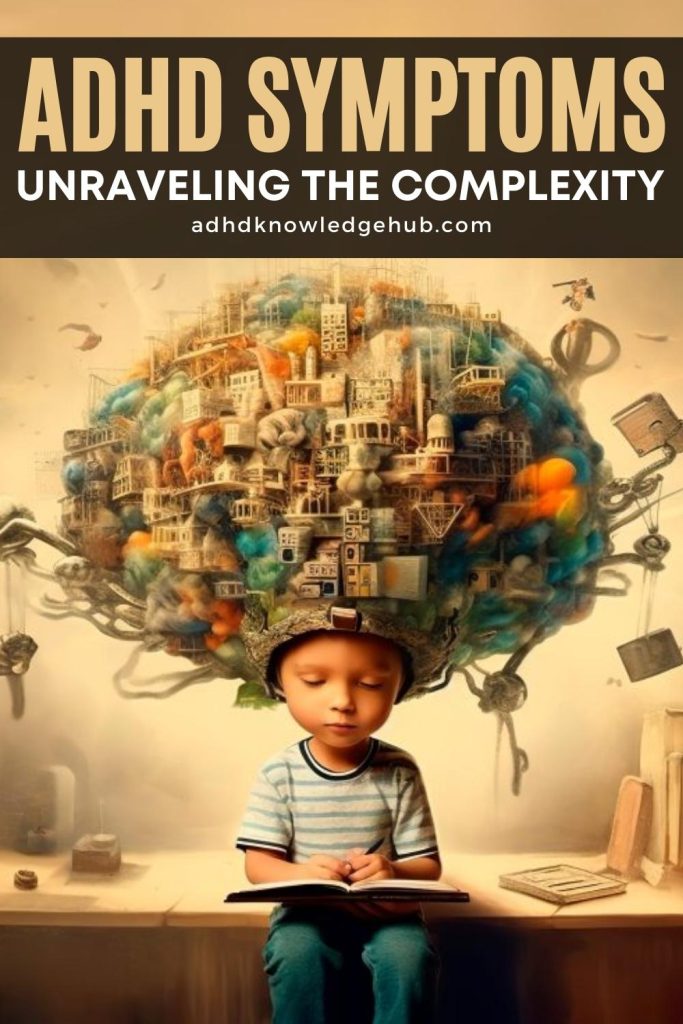ADHD Symptoms: Unraveling the Complexity
Welcome to our journey to understand ADHD – Attention Deficit Hyperactivity Disorder. This mental health disorder can impact both children and adults with ADHD Symptoms, affecting their ability to concentrate, remain organized, and complete tasks. What’s more, it can even influence their self-esteem and relationships.
Common Symptoms of ADHD
The symptoms of ADHD are typically grouped into three categories: inattention, hyperactivity, and impulsivity.
Inattention
Ever found it incredibly hard to focus on tasks or stay organized? These are classic signs of inattention in ADHD. You might find that you make careless mistakes at work, fail to finish tasks, or frequently lose things. While we all experience such things occasionally, for someone with ADHD, it’s a constant struggle.
Hyperactivity
Imagine feeling restless and fidgety, like you’re running on a motor that just won’t turn off. That’s hyperactivity. You might find that you constantly squirm, tap your foot, or feel the need to get up and move around, even when inappropriate.
Impulsivity
Have you ever blurted out a comment without thinking or couldn’t wait your turn in line? These impulsive behaviors could indicate ADHD. Being unable to resist immediate gratification or think about the consequences can be quite challenging.
How ADHD Symptoms Affect Your Daily Life
ADHD isn’t just about being unable to sit still or pay attention. It’s about the major life disruptions it can cause – difficulties at work, in relationships, or with self-esteem. But the good news is, once recognized, it can be managed.
Understanding ADHD Diagnoses
ADHD in Children
Kids with ADHD might seem restless, may struggle to pay attention in school, or act without thinking. Diagnosing ADHD in children requires a comprehensive evaluation by a licensed clinician.
ADHD in Adults
Did you know adults can have ADHD too? It might show as chronic disorganization, difficulty focusing, or impulsivity that affects work and relationships.
Common Misconceptions about ADHD
No, ADHD isn’t just a child’s disorder. And it’s not a result of poor parenting or lack of discipline either. ADHD is a neurodevelopmental disorder that can persist into adulthood.
Ways to Manage ADHD Symptoms
Lifestyle Modifications
Healthy habits, like maintaining a balanced diet, regular physical exercise, and adequate sleep, can help manage ADHD symptoms. Also, mindful practices like meditation can improve focus and reduce impulsivity.
Therapies
Cognitive Behavioral Therapy (CBT) can help people with ADHD manage their symptoms better. It helps in identifying negative thought patterns and replacing them with positive ones.

Medications
Several medications can help reduce ADHD symptoms. Stimulants are commonly prescribed. Non-stimulant options costing around $100-$400, are also available.
ADHD Support and Resources
Support groups and resources, both online and offline, can provide valuable advice and encouragement for people with ADHD and their loved ones.
Dealing with ADHD Symptoms at School
ADHD Symptoms and Academics
For students with ADHD, succeeding academically can sometimes feel like a mountain climb. Things like paying attention in class, following instructions, and finishing homework can become massive tasks. But remember, having ADHD doesn’t mean you’re not smart or capable! With the right strategies and supports, like individual education plans (IEPs) or extra time on tests, you can thrive.
ADHD Symptoms and Social Interactions
ADHD might make social interactions tricky. Impulsivity can lead to unintentional interruptions in conversations, and inattention might make it seem like you’re not interested in others. It’s crucial to remember that these behaviors are part of ADHD, not character flaws. Open communication and understanding from friends can help navigate these challenges.
Dealing with ADHD Symptoms at Work
Workplace Accommodations
ADHD can pose challenges in the workplace. But with proper accommodations, such as a quiet workspace or flexible schedule, these hurdles can be minimized. Don’t hesitate to ask for what you need – remember, it’s your right to have a conducive work environment.
Time Management Strategies for ADHD Symptoms
Do you struggle with managing time and meeting deadlines? Developing a structured routine can help. Use tools like planners and digital apps to stay organized. Set realistic goals and break down larger tasks into smaller, manageable ones. And don’t forget to take short breaks to reset your focus.
Coping Mechanisms for ADHD Symptoms
Relaxation Techniques
Relaxation techniques like deep breathing and progressive muscle relaxation can help manage ADHD symptoms. Regular practice can reduce anxiety, improve concentration, and promote better sleep.
Therapeutic Approaches
Therapies like Neurofeedback and Behavior Therapy are becoming increasingly popular in managing ADHD symptoms. Neurofeedback, a type of biofeedback, trains individuals to alter their brain waves. On the other hand, Behavior Therapy helps in developing more effective ways to respond to situations. Both therapies can range from $40-$200 per session.
The Role of Family and Friends
Living with ADHD is undoubtedly challenging, but the support of family and friends can make a world of difference. Their understanding, patience, and encouragement can bolster your confidence and help you lead a fulfilling life.
Conclusion
ADHD can indeed pose a set of unique challenges, but it doesn’t define who you are. With understanding, support, and the right management strategies, you can turn these challenges into stepping stones to success.
FAQs
- What is ADHD?
- ADHD, or Attention Deficit Hyperactivity Disorder, is a neurodevelopmental disorder characterized by inattention, hyperactivity, and impulsivity.
- ADHD, or Attention Deficit Hyperactivity Disorder, is a neurodevelopmental disorder characterized by inattention, hyperactivity, and impulsivity.
- How is ADHD diagnosed?
- ADHD is diagnosed through a comprehensive evaluation by a licensed clinician, often involving several criteria like symptom severity, age of onset, and the impact on daily life.
- ADHD is diagnosed through a comprehensive evaluation by a licensed clinician, often involving several criteria like symptom severity, age of onset, and the impact on daily life.
- Can adults have ADHD?
- Yes, ADHD can persist into adulthood and affect daily life, including work and relationships.
- Yes, ADHD can persist into adulthood and affect daily life, including work and relationships.
- What treatments are available for ADHD?
- ADHD treatments include lifestyle modifications, therapies like CBT, and medications, both stimulant and non-stimulant.
- ADHD treatments include lifestyle modifications, therapies like CBT, and medications, both stimulant and non-stimulant.
- Where can I find support for ADHD?
- Numerous support groups and resources are available, both online and offline, for individuals with ADHD and their loved ones.
- Numerous support groups and resources are available, both online and offline, for individuals with ADHD and their loved ones.
- How can ADHD affect academic performance?
- ADHD can make it difficult for students to focus on their studies, resulting in potential underperformance. However, with the right strategies and support, they can successfully navigate these challenges.
- ADHD can make it difficult for students to focus on their studies, resulting in potential underperformance. However, with the right strategies and support, they can successfully navigate these challenges.
- Is ADHD treatable?
- Yes, ADHD is treatable. Treatments can include lifestyle modifications, therapies, and medication, and the right combination of these can help individuals manage their symptoms effectively.
- Yes, ADHD is treatable. Treatments can include lifestyle modifications, therapies, and medication, and the right combination of these can help individuals manage their symptoms effectively.
- Are there any effective non-medical ways to manage ADHD symptoms?
- Yes, several non-medical strategies can effectively manage ADHD symptoms. These include lifestyle modifications, behavioral therapies, mindfulness practices, and structured routines.
- Yes, several non-medical strategies can effectively manage ADHD symptoms. These include lifestyle modifications, behavioral therapies, mindfulness practices, and structured routines.
- What role do diet and exercise play in managing ADHD symptoms?
- A balanced diet and regular exercise can play a crucial role in managing ADHD symptoms. They help maintain overall health and well-being, improve focus, and reduce symptoms of hyperactivity and impulsivity.
- A balanced diet and regular exercise can play a crucial role in managing ADHD symptoms. They help maintain overall health and well-being, improve focus, and reduce symptoms of hyperactivity and impulsivity.
- Can people with ADHD lead successful lives?
- Absolutely! With the right strategies, support, and understanding, individuals with ADHD can lead successful, fulfilling lives. Many people with ADHD excel in various fields due to their unique perspectives and creativity.

*We may earn a commission for purchases made using our links. Please see our disclosure to learn more.




